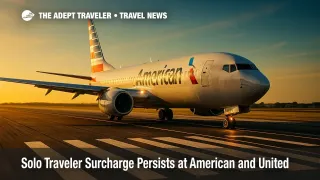Solo Traveler Surcharge Persists at American and United

American and United Airlines continue to tack extra costs onto tickets bought by solo flyers, even after Delta Air Lines scrapped the practice amid backlash. A fresh analysis finds American applying the surcharge on more than half of its domestic routes, while United has quietly re-introduced it on a smaller share of markets. Independent travelers booking weekday trips appear to bear the brunt-especially on short hops where low-cost competitors are absent.
Key Points
- Why it matters: Solo travelers can pay 5 %-plus more than pairs booking the same seat.
- Delta dropped the policy in May but rivals did not follow.
- The Economist found the surcharge on 57 % of American routes, 8 % of United's.
- Mark-ups greatest on short weekday flights without Southwest competition.
- Consumer advocates say the tactic targets business travelers least able to switch airlines.
Snapshot
A pricing study published this week shows American Airlines charging solo weekday passengers at least 5 percent more than groups on a majority of the routes examined. United Airlines revived a similar, though less widespread, surcharge after briefly matching Delta's move to end the policy. The differential, first flagged by Thrifty Traveler in May, reflects airline algorithms that assume a lone flyer is likely a time-pressed business traveler willing to pay more. Delta's retreat has left American and United increasingly isolated-yet neither carrier has signaled a policy change.
Background
The controversy began when aviation journalist Kyle Potter uncovered dozens of examples where a one-passenger booking cost markedly more than a two-passenger itinerary on the same flight. Delta, United, and American were each implicated. Delta responded within days, aligning solo fares with group pricing across its network. United briefly mirrored the fix before reverting; American never suspended the tactic. Analysts note that fare-class availability is tied to passenger count: once the lowest class sells out for a single seat, the system pushes the buyer into the next-higher price bucket, even if two seats at the lower fare remain. Critics argue the mechanism amounts to algorithmic price discrimination.
Latest Developments
New Economist Data Underscores American's Aggressive Use
In a route-by-route audit, The Economist found American levying a 5 percent-plus premium on solo weekday flyers in 57 percent of cases studied-particularly on segments under 1 000 miles. Markets overlapping Southwest's network showed fewer disparities, suggesting competitive pressure tempers the surcharge. United crossed the same threshold on only 8 percent of routes, but still applied smaller mark-ups on many others. Analysts believe American's yield-management team is leaning harder on the tactic because its network skews toward high-frequency business corridors.
Delta's Exit Heightens Spotlight on Remaining Holdouts
Delta's quick reversal has become a reference point for consumer advocates pressing American and United to follow suit. The Atlanta-based carrier said equalizing prices for all passengers "better aligns with our customer-first culture," a statement observers view as competitive posturing. With Delta marketing the change in corporate sales pitches, travel-management firms report increased client interest in shifting volume away from carriers still penalizing solo travelers. Whether that pressure proves enough to move the needle at American-whose management has defended dynamic pricing as "market-responsive"-remains to be seen.
Analysis
Economically, the solo surcharge is a textbook example of third-degree price discrimination: airlines segment travelers by purchase behavior rather than explicit demographics. A single-seat search, especially for mid-week departures and returns, signals a likely business itinerary. Corporate travelers tend to book closer to departure and place greater value on schedule over cost, giving revenue-management systems license to push prices higher. Couples or groups, in contrast, are statistically more likely to travel for leisure, plan earlier, and exhibit price sensitivity.
From a consumer-trust standpoint, however, the policy erodes goodwill. Travelers increasingly comparison-shop across metasearch engines that expose fare spreads, making opaque surcharges more visible. Delta's abandonment demonstrates the margin hit may be tolerable when offset by brand equity and incremental demand from price-sensitive solos. American's heavier reliance suggests either a higher business-travel mix or confidence that its AAdvantage loyalty base is sticky enough to absorb discontent. United's flip-flop indicates internal debate over balancing revenue against perception. As corporate travel continues its uneven recovery, airlines may revisit these levers-but only sustained public and competitive pressure is likely to force alignment.
Final Thoughts
Solo travelers already face single-supplement hotel rates and ride-share minimums. Adding an airline surcharge widens a cost gap that many see as unfair. Delta's withdrawal proves major carriers can thrive without penalizing solo flyers. Whether American and United follow suit-or double down-will determine if the solo traveler airline surcharge becomes an industry relic or an entrenched fee.
